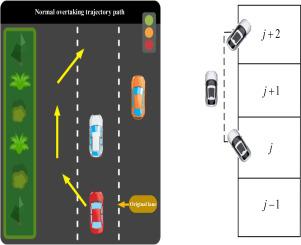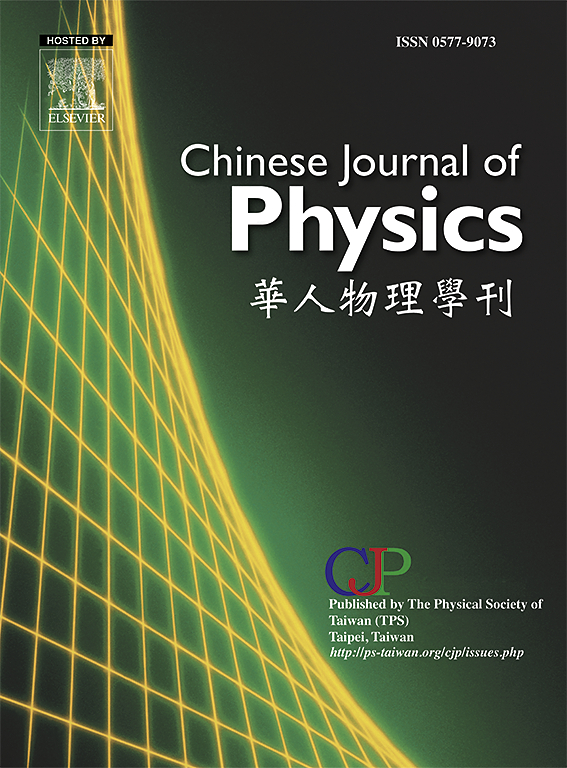将感知范围差异与通过效应相结合的混合网格流体力学模型的拥堵交通模式
IF 4.6
2区 物理与天体物理
Q1 PHYSICS, MULTIDISCIPLINARY
引用次数: 0
摘要
借助车对物(V2X)网络连接技术,互联自动驾驶汽车(CAV)可以拓宽驾驶员的感知边界,接收更多的外源车辆信息,从而控制车辆下一刻的加速信息。然而,受制于当代通信网络和复杂的车辆控制技术,CAV 的推广过程是漫长的,在这一过渡阶段,CAV 和人类驾驶的车辆(HDV)将在道路上并存。此外,尽管超车行为是一种基本的微观驾驶行为,但在交通流模型研究中受到的关注有限。为了弥补这些不足,我们将两种不同类型车辆之间的感知范围差异与超车效应整合在一起,从而将 CAV 的百分比率引入晶格流体力学模型。随后,通过线性稳定性分析确定与新模型相关的稳定性规范。当未达到稳定条件时,我们将研究新模型的复杂行为。同时确定相关的现有条件和修正的 Korteweg-de Vries(mKdV)方程。当通过比不足时,无堵塞和扭结堵塞构成了整个相区;当通过比超过最小值时,初始不稳定区域可分离为两个额外的部分:混乱子区域和扭结堵塞子区域,密度波从扭结-班多交通流波逐渐过渡到混乱相。数值实验结果与理论推导一致。本文章由计算机程序翻译,如有差异,请以英文原文为准。

Congested traffic patterns of mixed lattice hydrodynamic model combining the perceptual range differences with passing effect
With the aid of Vehicle-to-everything (V2X) technologies for network connectivity, connected autonomous vehicles (CAVs) can broaden the drivers' perceptual boundaries and receive a greater quantity of exogenous vehicle information, thereby governing the vehicle's acceleration information of the next moment. Nonetheless, constrained by contemporary communication networks and sophisticated vehicle control technology, the process of promoting CAVs is long-lasting, and throughout this stage of transition, both CAVs and human-driven vehicles (HDVs) will coexist on the road. Moreover, passing behaviour has received limited attention in the research on the traffic flow models despite being a fundamental microscopic driving behaviour. To bridge these gaps, we introduce the percentage ratios of CAVs into the lattice hydrodynamic model by integrating the perceptual range differences between two different types of vehicles with passing effects. Subsequently, the stability norm associated with the new model is ascertained by performing the linear stability analysis. When the stability condition is not achieved, we investigate the complex behaviour of the new model. The associated existing conditions and the modified Korteweg-de Vries (mKdV) equation are determined simultaneously. When the passing ratio is inadequate, no jam and kink jam make up the whole phase region; when the passing ratio surpasses the minimum, the initial unstable region can be segregated into two extra segments: the chaotic sub-region and the kink jam sub-region, and the density wave progressively transitions from being a kink-Bando traffic wave to a chaotic phase. The findings of the numerical experiment are consistent with with the theoretical derivation.
求助全文
通过发布文献求助,成功后即可免费获取论文全文。
去求助
来源期刊

Chinese Journal of Physics
物理-物理:综合
CiteScore
8.50
自引率
10.00%
发文量
361
审稿时长
44 days
期刊介绍:
The Chinese Journal of Physics publishes important advances in various branches in physics, including statistical and biophysical physics, condensed matter physics, atomic/molecular physics, optics, particle physics and nuclear physics.
The editors welcome manuscripts on:
-General Physics: Statistical and Quantum Mechanics, etc.-
Gravitation and Astrophysics-
Elementary Particles and Fields-
Nuclear Physics-
Atomic, Molecular, and Optical Physics-
Quantum Information and Quantum Computation-
Fluid Dynamics, Nonlinear Dynamics, Chaos, and Complex Networks-
Plasma and Beam Physics-
Condensed Matter: Structure, etc.-
Condensed Matter: Electronic Properties, etc.-
Polymer, Soft Matter, Biological, and Interdisciplinary Physics.
CJP publishes regular research papers, feature articles and review papers.
 求助内容:
求助内容: 应助结果提醒方式:
应助结果提醒方式:


